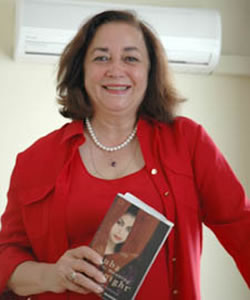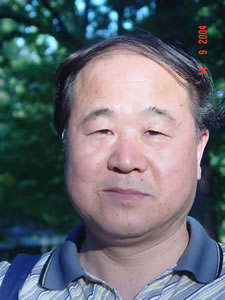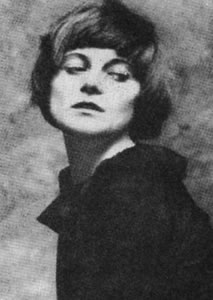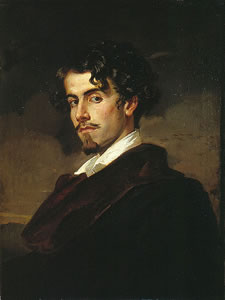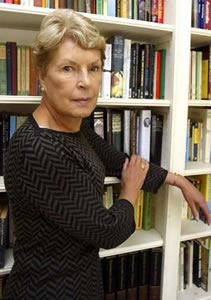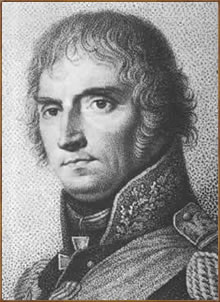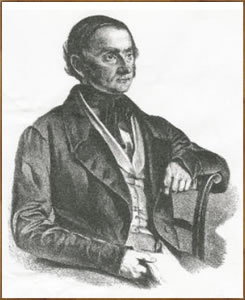De Franse dichter, schrijver en acteur Pêr-Jakez Helias werd geboren op 17 februari 1914 in Pouldreuzig, Penn-ar-Bed. Zie ook alle tags voor Pêr-Jakez Helias op dit blog.
Uit: Le cheval d’orguei
« Il ne dira pas un mot de plus. Le voilà parti pour les champs sans tourner la tête car il sait que je vais me mettre en campagne. Je commence par examiner de près le bâton à bouillie qui est dressé dans le coin de l’âtre. Il a une queue pour le tenir et une tête (bout) pour remuer la pâte. Serait-ce lui ? Mais grand-père n’avait qu’à le prendre. Et d’ailleurs il n’y en a qu’un. Comment serait-il plus facile d’en trouver deux ? Je m’en vais dans l’appentis. Là, il y a des bêches, des pelles, des râteaux, des fourches, des pioches, tous emmanchés. Un manche n’a qu’un bout puisque l’autre est pris par le fer et l’outil. Mais un manche peut-il passer pour un bâton ? Je prends sur moi de répondre non. Dix minutes plus tard, je remonte le sentier qui borde le Champ du Recteur, je descends dans les prairies. Sur tous les talus, il y a des douzaines de rameaux qui attendent de devenir bâtons. Tenez, ces deux-là qui ont l’air d’êtres frères ou soeurs. Dans ma tête, je les vois coupés, mais ils ont quatre bouts à eux deux. Alors je reviens vers la maison pour regarder aller les choses. Je laisse le soleil tirer le jour derrière lui. Certes, je n’ai pas moins de courage qu’un autre. Les bâtons qui n’ont qu’un seul bout chacun, je suis prêt à franchir toutes les limites de mes six ans et demi pour mettre la main dessus. Mais je sais déjà que si je ne les trouve pas avant ce soir, grand-père les aura trouvés lui-même. Et j’éprouve un étrange plaisir à savourer mon échec en escomptant ma surprise quand le vieil homme m’apportera la « clé du château ». C’est ainsi qu’il appelle la solution des embrouilles qui nous cernent de toutes parts pendant tout le temps que nous avons les yeux ouverts. Lui, cette clé, il la trouve à tous les coups. Justement, le voilà qui revient du champ de Méot. A son pas, comme d’habitude, et le chapeau ramené sur les sourcils parce que le couchant, ce soir, est rouge-braise, trop rouge pour les yeux bleus qu’il a. Il manie un bâton qui lui sert, de temps à autre, à aider une jambe gauche devenue paresseuse à force d’aller. Un seul bâton, pas deux, sinon je jurerais qu’il a trouvé ce qui lui manquait. Car ce bâton n’est pas celui qu’il a pris pour partir. Des bâtons, grand-père en a plus de sept de sa fabrication, sans compter la canne du dimanche pour aller à la messe et qui a été achetée en magasin, s’il vous plaît. »

Pêr-Jakez Helias (17 februari 1914 – 13 augustus 1995)
De Duitse dichter en schrijver Georg Weerth werd geboren op 17 februari 1822 in Detmold. Zie ook alle tags voor Georg Weerth op dit blog.
Herüber zog eine schwarze Nacht
Herüber zog eine schwarze Nacht
Die Föhren rauschten im Sturme;
Es hat das Wetter eild zerkracht
Die Kirche mit ihrem Turme.
Zerschmettert das Kreuz; zerdrückt den Altar;
Zermalmt das Gebein in den Särgen –
Die gotischen Bögen wälzen sich
Donnernd hinab von den Bergen.
Zum Dorfe stürzt sich Turm und Chor
Als wie zu einem Grabe –
Da fährt entsetzt vom Lager empor
Und spricht zur Mutter der Knabe:
“Ach Mutter, mir träumte ein Traum so schwer,
Das hat den Schlaf mir verdorben.
Ach Mutter, mir träumte, soeben wär´
Der liebe Herr Gott gestorben.”
Der arme Tom
Es sprach der Tod zum armen Tom:
“Armer Tom, komm, o komm,
Komm hinab ins kühle Grab,
Komm, Tom, komm hinab!
Sei nur getrost und fasse Mut,
Armer Tom, bin dir gut.
Komm, ich bringe dich zur Ruh,
Komm, Tom, ich deck dich zu!
Ich deck dich zu mit Blumen fein,
Armer Tom; alle Pein
Sollst du nun vergessen, Tom,
Komm, Tom, komm, o komm,
O komm, dieweil dein Bett gemacht!” –
Durch die Nacht klang es sacht,
Klang es also wundersam:
“Komm, Tom!” – bis Tom kam.

Georg Weerth (17 februari 1822 – 30 juli 1856)
Cover
De Duitse dichter en schrijver Friedrich Maximilian Klinger werd geboren op 17 februari 1752 in Frankfurt am Main. Zie ook alle tags voor Friedrich Klinger op dit blog.
Uit: Faust’s Leben, Taten und Höllenfahrt
„In seiner Lage schien ihm der kürzeste und bequemste Weg zum Glück und Ruhm die Wissenschaften zu sein; doch kaum hatte er ihren Zauber gekostet, als der heftigste Durst nach Wahrheit in seiner Seele entbrannte. Jeder, der diese Sirenen kennt, und ihnen ihren betrügrischen Gesang abgelernt hat, fühlt (wenn er die Wissenschaften nicht als Handwerk treibt) ohne mein Erinnern, daß ihm sein Zweck, diesen brennenden Durst zu stillen, entwischen mußte. Nach langem Herumtaumeln in diesem Labyrinthe waren seine Ernte: Zweifel, Unwille über die Kurzsichtigkeit des Menschen, Mißmut und Murren gegen den, der ihn geschaffen, das Licht zu ahnden, ohne die dicke Finsternis durchbrechen zu können. Noch wäre er glücklich gewesen, hätte er mit diesen Empfindungen allein zu kämpfen gehabt; da aber das Lesen der Weisen und Dichter tausend neue Bedürfnisse in seiner Seele erweckte, und seine nun beflügelte und zugekünstelte Einbildungskraft die reizenden Gegenstände des Genusses, die Ansehen und Gold allein verschaffen können, unablässig vor seine Augen zauberte, so rann sein Blut wie Feuer in seinen Adern, und seine übrigen Fähigkeiten wurden bald von diesem Gefühl allein verschlungen. Durch die merkwürdige Erfindung der Buchdruckerei glaubte er sich endlich, die Tore zum Reichtum, Ruhm und Genuß aufgesprengt zu haben. Er hatte sein ganzes Vermögen darauf gewandt, sie zur Vollkommenheit zu bringen, und trat nun vor die Menschen mit seiner Entdeckung; aber ihre Laulichkeit und Kälte überzeugten ihn bald, daß er, der größte Erfinder seines Jahrhunderts, mit seinem jungen Weibe und seinen Kindern Hungers sterben könnte, wenn er nichts anders zu treiben wüßte. Von dieser stolzen Hoffnung so tief herabgesunken, gedrückt von einer schweren Schuldenlast, die er sich durch leichtsinnige Lebensart, übertriebene Freigebigkeit, unvorsichtige Bürgschaften und Unterstützung falscher Freunde auf den Hals gezogen, warf er einen Blick auf die Menschen, sein Groll färbte ihn schwarz, sein häusliches Band, da er seine Familie nicht mehr zu erhalten wußte, ward ihm zur Last, und er fing für immer an zu glauben, daß die Gerechtigkeit nicht den Vorsitz bei der Austeilung des Glücks der Menschen habe. Er nagte an dem Gedanken: wie und woher es käme, daß der fähige Kopf und der edle Mann überall unterdrückt, vernachlässigt sei, im Elende schmachten während der Schelm und der Dummkopf reich, glücklich und angesehen wären. So leicht nun Weisen und Prediger diesen Zweifel zu heben wissen, so erbittert er gleichwohl, da sie nur zu dem Verstande reden, und das Gefühl durch die tägliche Erfahrung verwundet wird, das Herz des Stolzen, und schlägt den Sanftern nieder. Zu den erstern gehörte Faust. Von diesem Augenblick strebte sein gekränkter Geist, den verschlungenen Knäuel aufzuwickeln, über dessen Auflösung so viele Tausende die Ruhe und das Glück ihres Lebens umsonst verloren haben.“

Friedrich Maximilian Klinger (17 februari 1752 – 25 februari 1831)
De Australische dichteres, schrijfster, uitgeefster en suffragette Louisa Lawson werd geboren op 17 februari 1848 in Mudgee, New South Wales. Zie ook alle tags voor Louisa Lawson op dit blog.
To A Bird
Bright little warbler of the air.
The world to thee I ween is fair,
And free thy life from shade of care,
So gaily dost thou sing.
While from thy happy throat are sent,
Those floods of song in ravishment,
Thou shamest me without intent,
Sad mourner that I be.
But birdie dear, didst thou but see
The world as it appears to me ;
Then ‘pretty,’ ‘pretty,’ might not be
The burden of thy song.
To one who knows not grief or care,
I doubt me not the world is fair,
And ‘pretty,’ ‘pretty’ everywhere
As thou dost iterate.
But oh ! could I like thee arise,
And wing my way toward the skies ;
Not here mid human miseries
One moment would I dwell.
But once released from bonds of clay,
I’d upward soar till thy sweet lay
Did in the distance melt away
Amidst an awful space.
I d pause not till through shining breach,
I’d catch in song that seraphs teach,
Notes only angel voices reach,
Where my loved ones are gone.
Ah, birdie ! were it thine to know,
The grief that makes my sad tears flew,
Thou couldst not sweetly warble so
Thy little heart would break.

Louisa Lawson (17 februari 1848 – 12 augustus 1920)
De Duitse dichter Max Schneckenburger werd geboren op 17 februari 1819 in Talheim bij Tuttlingen. Zie ook alle tags voor Max Schneckenburger op dit blog.
La garde au Rhin (Fragment)
Comme un tonnerre fuse un cri,
Comme une vague et un défi :
« Au Rhin, au Rhin, au Rhin all’mand !
Qui veut le garder maintenant? »
Toi ma patrie, non, ne crains rien,
Ferme se tient la garde au Rhin !
Le cri par la campagne va et court ;
L’œil brille, car il fait le tour.
Oui, l’Allemand fidèle et fort,
Défend son saint pays d’abord.
Toi ma patrie, non, ne crains rien,
Ferme se tient la garde au Rhin !

Max Schneckenburger (17 februari 1819 – 3 mei 1849)
De Engelse schrijfster Maria Francesca Rossetti werd geboren in Londen op 17 februari 1827. Zie ook alle tags voor Maria Rossetti op dit blog.
Uit: A Shadow Of Dante
“…but the fall of Lucifer at once produced the one and pre-pared the other, convulsing and inverting the world which God had made. The rebel Seraph fell headlong from Heaven directly above the Western hemisphere, till then a continent, in whose midst was Eden ; and Earth, in the twofold horror of his sight and presence, underwent a two-fold change. First, to veil her face, she brought in upon herself the vast floods of the Eastern Sea-hemisphere, trans-ferring to their place all her dry land, save Eden, which thus was left insulated in mid-Ocean. And secondly, to escape his contact, as he sank and sank through her sur-face, through her bowels, till the middle of his colossal frame, having reached the centre of gravity, remained there fixed from the sheer physical impossibility of sinking any lower, she caused a vast mass of her internal substance to flee before his face ; and leaving eternally void the space it once had occupied to form the inverted pit-cone of Hell, she heaved it up directly under Eden, amid the new waste of waters, to form the towering mountain-cone on whose peak the Terrestrial Paradise should thenceforth to the end of Time sit far .above all elemental strife, and whose sides should, after the Redemption of Man, furnish the Purgatorial stair whereby his foot might aspire once more to tread, his eye to contemplate, his regained inheritance. Thus two Elements, Earth and Water, hemispherically divided, constitute the Sphere which forms the innermost and immoveable kernel of the Dantesque Universe. It is enveloped by the Sphere of Air, subject to the variations of heat and cold, rain and drought, wind and tempest, and reaching up to that particular point of the Western Mountain where the Ante-Purgatory ends, and the Gate of S. Peter admits holy but still imperfect souls to Purgatory proper, which being situated within the Sphere of Fire or 2Ether, is secure from atmospheric change. Beyond this highest elemental region lie the Nine Heavens, each alike a hollow revolving sphere, enclosing and enclosed. The First Heaven is of the Moon, the Second of Mercury, the Third of Venus, the Fourth of the Sun (in Dante’s time regarded as a planet), the Fifth of Mars, the Sixth of Jupiter, the Seventh of Saturn, the Eighth of the Fixed Stars ; the Ninth is the Starless Crystalline Heaven or Primum Mobile, which, itself the most rapid of all in its revolutions, is the root of Time and Change throughout Creation, and the source and measure of the gradually slackening movement of all the Heavens within it. Without it is the Tenth Heaven, the motionless boundless Empyrean, the special dwelling-place of the Most High God, and the eternal home of His Saints.”

Maria Rossetti (17 februari 1827 – 24 november 1876)
Portret door Constantin Daniel Rosenthal









